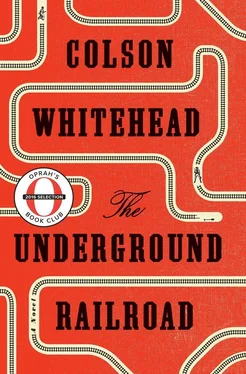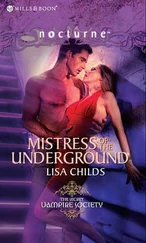“It’s not made for a locomotive,” Royal said. “The tunnel is too small, see. It doesn’t connect to the rest of the line.”
No one had been there in a long time. Cora asked where it went.
Royal grinned. “It’s from before my time. The conductor I replaced showed me when I took over this section. I took that handcar a few miles in, but it was too unsettling. The walls hugging and coming close.” Cora knew better than to ask who built it. All the railroad men, from Lumbly to Royal, countered with a variation of “Who do you think made it? Who makes everything?” She’d get him to tell her one day, she decided.
The ghost tunnel had never been used, Royal said, as far as anyone knew. No one knew when it was dug, or who had lived above. Some engineers told him the house had been built by one of the old surveyors, like Lewis and Clark, who had explored and mapped the American wilderness. “If you saw the entire country,” Royal said, “from the Atlantic to the Pacific, the great Niagara Falls and the Rio Grande, would you make a home here, in the woods of Indiana?” An old station master offered that it had been the home of a major general in the Revolutionary War, a man who had witnessed much bloodshed and had withdrawn from the young nation after helping to bring it into existence.
A recluse story contained more sense, but Royal thought the army part was claptrap. Did Cora notice that there was no sign that someone had lived there, not even an old toothpick or a nail in the wall?
A notion crept over her like a shadow: that this station was not the start of the line but its terminus. Construction hadn’t started beneath the house but at the other end of the black hole. As if in the world there were no places to escape to, only places to flee.
In the cellar above, the scavengers roused to activity, scraping.
Such a dank little hole. Any trip with this point of origin could only be ill-fated. The last time she’d been in one of the railroad’s departure stations it had been brightly lit, generous in its comforts, and had delivered her to the bounty of Valentine. That was in Tennessee, when they waited to be carried away from the dangerous escapade with Ridgeway. The events of that night still made her heart quicken.
—
ONCE they left the slave catcher and his wagon, her rescuers gave their names. Royal was the man who’d spied her in town; his partner was Red, owing to the rusty color of his curly hair. The timid one was Justin, a fugitive like her and unaccustomed to waving bowie knives at white men.
After Cora agreed to go with them — never had an inevitability been so politely proposed — the three men made haste to hide the signs of the altercation. Homer’s looming presence, somewhere in the dark, magnified the urgency. Red kept watch with his rifle as Royal and Justin chained first Boseman and then Ridgeway to the wagon. The slave catcher did not speak, sneering at Cora with his bloody mouth the while.
“That one,” she said, pointing, and Red chained him to the ring her captors had used for Jasper.
They drove the slave catcher’s wagon to the far edge of the pasture, hiding it from the road. Red shackled Ridgeway five times over, using every chain in the wagon’s boot. He tossed the keys into the grass. They chased away the horses. Of Homer, there was no sound; perhaps the boy skulked just outside the lantern light. Whatever head start these measures gave would have to suffice. Boseman let out a mortifying gasp as they departed, which Cora took as his death rattle.
Her rescuers’ cart was a short walk down the road from Ridgeway’s camp. She and Justin hid under a thick blanket in the back and they charged off, at dangerous velocity given the darkness and the uniformly poor quality of Tennessee roads. So agitated by the fight were Royal and Red that they forgot to blindfold their cargo for several miles. Royal was bashful about it. “It’s for the safety of the depot, miss.”
That third trip on the underground railroad began beneath a stable. By now a station meant a descent down impossibly deep steps and the revelation of the next station’s character. The owner of the premises was away on business, Royal told them as he untied the rags from their eyes, a ruse to hide his part in their enterprise. Cora never got his name, nor that of the town of departure. Just that he was another person of subterranean inclinations — and a taste for imported white tile. The walls of the station were covered with it.
“Every time we come down here, there’s something new,” Royal said. The four of them waited for the train at a table covered with a white tablecloth, sitting in heavy chairs upholstered in crimson. Fresh flowers jutted from a vase and paintings of farmland hung on the walls. There was a cut-crystal pitcher full of water, a basket of fruit, and a big loaf of pumpernickel for them to eat.
“This is a rich folk’s house,” Justin said.
“He likes to maintain a mood,” Royal answered.
Red said he liked the white tiles, which were an improvement over the pine boards that had been there formerly. “I don’t know how he put them up himself,” he added.
Royal said he hoped the help had a still tongue.
“You killed that man,” Justin said. He was numb. They had discovered a jug of wine inside a cupboard and the fugitive drank with abandon.
“Ask the girl if he had it coming,” Red said.
Royal grabbed Red’s forearm to stop the man’s trembling. His friend had never taken a man’s life before. The premise of their misadventure was enough to get them hanged, but the murder ensured grim abuse before they swung. Royal was taken aback when Cora told him later that she was wanted for murder in Georgia. He recovered and said, “Then our course was already set from the moment I laid eyes on you, on that dirty street.”
Royal was the first freeborn man Cora had ever met. There were many freemen in South Carolina who’d relocated for the so-called opportunities, but they’d served their time as chattel. Royal took in liberty with his first breath.
He was raised in Connecticut; his father was a barber and his mother a midwife. They were freeborn as well, hailing from New York City. On their orders, Royal apprenticed with a printer as soon as he was old enough to labor. His parents believed in the dignity of the honest trades, envisioning the generations of their family branching into the future, each more accomplished than the last. If the north had eliminated slavery, one day the abominable institution would fall everywhere. The negro’s story may have started in this country with degradation, but triumph and prosperity would be his one day.
Had his parents realized the power of their reminiscences on the boy, they might have been more reserved in their stories of their native city. Royal lit out for Manhattan at eighteen, and his first sight of the majestic city from the rail of the ferry confirmed his fate. He took a room with three other men in a colored boardinghouse in Five Points and hung a shingle as a barber until he met the famous Eugene Wheeler. The white man started a conversation with Royal at an antislavery meeting; impressed, Wheeler told him to come to his office the next day. Royal had read of the man’s exploits in the newspaper — lawyer, abolitionist crusader, bane of slavers and those who did their dirty work. Royal scouted the city jail for runaways the lawyer might defend, ran messages between enigmatic persons, and distributed funds from antislavery societies to relocated fugitives. By his official induction into the underground railroad, he had been its instrument for some time.
“I oil the pistons,” he liked to say. Royal placed the coded messages in the classifieds that informed runaways and conductors of departures. He bribed ship captains and constables, rowed shivering pregnant women across rivers in leaky skiffs, and delivered judges’ release orders to frowning deputies. In general he was paired with a white ally, but Royal’s quick wits and proud bearing made it clear the color of his skin was no impediment. “A free black walks different than a slave,” he said. “White people recognize it immediately, even if they don’t know it. Walks different, talks different, carries himself different. It’s in the bones.” Constables never detained him and kidnappers kept their distance.
Читать дальше












